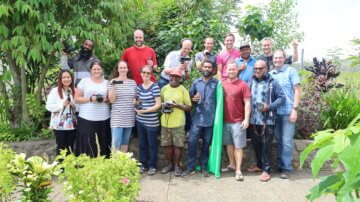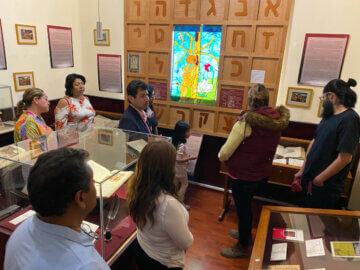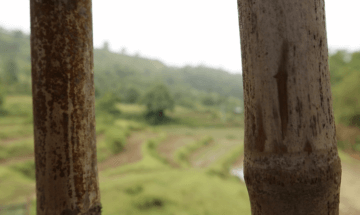Looking ahead at 2024
 Stephen Coertze
Stephen Coertze
Executive Director
Wycliffe Global Alliance
February 2024
Dear Friends
Warm greetings from Johannesburg! As 2024 unfolds, we marvel at the work of God in our rapidly changing world. And, we look forward to a number of gatherings and conversations intended to draw us together as an Alliance. Let me take this opportunity to mention a few things on our collective agenda for this year.
Covenant 3
In March, the Alliance Board of Directors will review a new version of our Covenant/Statement of Commitment. They will send it to Alliance organisations for their input, and then will finalise it in time for the Global Gathering in October-November. Then in early 2025 we will start the signing / re-signing process with Alliance organisations.
Alliance organisations sign this Covenant/Statement of Commitment with each other in recognition of their participation in the Alliance community and in the mission of God. Periodically, the document is updated and a new signing process takes place. This will be the third version; recommended minor changes from the current covenant are mostly stylistic, with a word or phrasing change here and there.
The church in Bible translation
We have had a number of conversations in recent years about the Alliance’s understanding of and relationship with the worldwide church. The Alliance has several core, foundational documents regarding the church—including a statement recognizing that it is God’s primary instrument for mission. Our Bible Translation Programs Philosophy statement mentions the church prominently. We believe, though, that we also need a full, separate statement about the church. This will recognize the role of the church in Bible translation and the call for the Alliance to come alongside it and participate together. The Alliance Leadership Team has presented a draft statement to the Board, which will be released after the Board’s March meeting. We will share the statement with the whole Alliance and follow up with plans.
We envision this leading to a global conversation in 2024 involving Alliance organisations that are church denominations, and also other churches that are not necessarily Alliance organisations. Historically, the Bible translation movement has diminished church participation to praying, sending people and sending money. But are there more ways in which the church desires to participate? Where and how is it already happening?
Our first priority will be to meet with church leaders from around the world and design the discussion, so that we don’t simply come with our agenda. That meeting will lead to the wider conversation and later analysis of what we discussed and learned together.
Global Gathering
This year will culminate with our Global Gathering, planned for 31 October through 4 November in Johannesburg. This will be the first in-person Global Gathering since 2016, as the 2020 gathering was canceled by the pandemic.
This year’s gathering provides another indication of a new era in Bible translation; it will be the first one held solely as an Alliance event rather than a joint event with SIL. Our theme is Growing Together, and four expressions of that theme will be woven into the program: Community, Explore and Discern Together, Worship and Celebrate.
We look forward to coming away with a clear sense of where we are together as an Alliance, and of the journey ahead as we move into 2025 and beyond.
Power in mission
Starting late this year, the Alliance will prepare for global discussions about power in mission, and specifically in Bible translation.
We want to look at systems of power and control—decision-making in one context that is forced onto other contexts. Today’s mission structures and even mission theology are still based largely on Christendom as a dominant historical and cultural force. By Christendom, I mean the Western countries, empires and power structures where Christianity has been the dominant religion. Mission was built on the idea of from the West to the rest.
The reality has rapidly shifted: Mission today is from everywhere, to everywhere. But many of our structures and systems are still built and driven from the Christendom paradigm. We need to ask questions about that. What is different? Do those traditional structures still serve a purpose? Or do we need to understand and implement structures that are more relevant to the way we understand mission today?
Power in mission can be seen in several major ways. These include:
Resources. I am thinking here of not just organisations’ capacity to give resources such as money, but also their capacity to request money. Some organisations just have a more eloquent way of requesting funding, and they have an edge over organisations or individuals that don’t have that same capacity or training.
Structures. Some organisations have been so well-structured that they have dominated other contexts—which then have become dependent on them. This might not always be the best approach in participating with God in his mission. We might get the most expedient results, but it does not mean that our process honours God.
Information. Researchers realise that the one who controls the statistics wins the game. This raises questions about our own statistics on the status of Bible translation, both globally and locally. Organisations utilise such statistics to decide where they are going to influence and participate. There’s nothing wrong with that, but we know the picture is incomplete. Communities in desperate need of help might not receive it because the statistics don’t highlight them.
For centuries, the symbols of Christianity and Christendom—whether we recognised them or not—have been a crown, a throne and a sceptre. Symbols of earthly power. But the true symbols of Christianity look very different: a crown of thorns. The cross. The empty tomb, implying death and resurrection. A seed that first has to die in the ground to be able to bear growth. A broken vessel – the cup and bread of communion.
How do those symbols inform us as an Alliance? I think this conversation will help us to revisit some of our past reflections, such as the ones regarding community or funding, that are part of our ethos. It will be a chance to assess together how we are doing as an Alliance. Late this year, after the Global Gathering, we will give more structure and thought to this conversation for 2025 and beyond.
Meantime, let me recommend The Mission Matrix by Kirk Franklin and Paul Bendor-Samuel with Deborah Crough. This new book by three Alliance veterans helps us understand our journey as we move from the Christendom model of mission into a new, evolving mission context.
Publications
Speaking of Alliance-related publications, let me mention two more. One is the newly published book, The Journey Concept by Susan Van Wynen, our Consultant for Strategy. With input from more than 50 church and mission leaders in 36 nations, the book encourages the church and mission movements to move beyond strategy models founded in military, industrial-age and competitive thinking. The Journey Concept seeks to help anyone participating in God’s mission navigate continuous change and multiple contexts and cultures with grace and discernment, while remaining firmly grounded and growing in God and his Word.
And then I have asked Kirk Franklin, my predecessor as the Alliance Executive Director, to work on an additional publication for us. This will focus on our understanding of collaboration—lessons we have learned within the Alliance and how we are seeing the concept develop further.
Vision 2025
A joint SIL and Alliance team is planning an event for May 2025 to celebrate Vision 2025. We will have more about that soon, and several Alliance publications throughout this year will discuss the impact and implications of Vision 2025. Let me point you first to The Journey Podcast, which features a two-part interview with John Watters. It was John in 1999 who first suggested Vision 2025, that Bible translation could be started in the next generation for every language community that needs it. It’s a fascinating conversation. Especially for our organisations for whom Vision 2025 is less familiar, this provides a good introduction.
In the Alliance areas
A number of activities and discussions are taking place in the Alliance’s four areas.
In the Americas area, national Bible translation roundtables continue to multiply – we added four new ones just last year. Now, for 2024 we look forward to these roundtables bridging national borders for cross-regional discussions within the Americas.
The Europe area is looking at how to assist the church in several emerging realities: the diaspora and its relationship to Bible translation, translation in Roma languages, and translation in Deaf sign languages.
Africa area organisations have caught on very well to the discussions on influences on the different Alliance organisations as they relate to Bible translation, external and internal influences on the organisations. They will continue to unpack those as they consider their own participation in Bible translation.
The Asia-Pacific area plans an area conference this May. It will be the first opportunity for Nicky Chong, our new area director, to meet with all of the Asia-Pacific Alliance organisations in the same room. This conference will help set the direction for further collaboration within the region and globally. I will participate as well.
• • •
So, that is a brief overview of the year ahead for the Alliance. Of course, anything and everything could change overnight. We learned that four years ago as a global pandemic shifted our course radically. Come what may, we grow in the assurance that God remains firmly in control and that he chooses to involve us all in building his kingdom—often in surprising new ways. May we all grow more like Jesus in this journey together.

The latest
View all articles
03/2024 Pacific: Papua New Guinea
Informing, teaching, inspiring: PNG workshop teaches video storytelling for language communities
PNG workshop teaches video storytelling for language communities
Read more
01/2024 Americas
Telling the Bible's Story
It may come as a surprise that a museum is among the Wycliffe Global Alliance organisations.
Read more
12/2023 Asia, Philippines
Seeing God through the Old Testament Lens
Having successfully completed the New Testament in 2009, the Kinaray-a speaking people, in partnership with the Translators Association of the Philippines, discover God more as they translate the Old Testament.
Read more